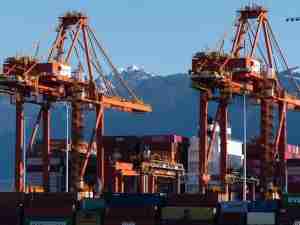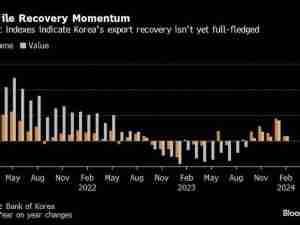A White House economist described the first day of key U.S.-China trade talks in Beijing as “fairly positive” but said the real test will be China’s ability to deliver on its promises of economic change.
The U.S. has turned over to China a “detailed list of asks,” Mark Calabria, chief economist to U.S. Vice President Mike Pence, said during an event in Washington on Thursday. While he declined to give specifics, he said the U.S. wants China to lower its tariffs rates to match U.S. levies, in a move that could boost exports of American goods to the world’s No. 2 economy.
“What I heard from the first day, and again they’ve been there for a full day of negotiations, has been fairly positive,” Calabria said. “The difficulty will always be that we will most of the time hear pretty positive things from China and the question is whether they will actually do them. So that’s going to be the tough part.”
His comments are the first public update on the progress of closed-door discussions between President Donald Trump’s economic team and officials in Beijing that began Thursday and are scheduled to run through Friday. China’s largest media outlets have been ordered to refrain from reporting any material beyond official press releases related to the talks, according to people familiar with the matter.
Treasury Secretary Steven Mnuchin, who is leading the delegation, Commerce Secretary Wilbur Ross, U.S. Trade Representative Robert Lighthizer and White House economic adviser Larry Kudlow declined to comment to reporters on arrival at their hotel after meetings and a dinner with their Chinese counterparts on Thursday evening.
The U.S. has tempered expectations of a major breakthrough from the discussions, which are expected to focus on U.S. concerns over China’s state-driven economy, forced technology transfers and America’s widening trade deficit with China. Underscoring the friction, a U.S. report released Thursday showed the trade gap with China surged by 16 percent to more than $91 billion in the first quarter of this year.
China’s government won’t accept any U.S. preconditions for negotiations such as abandoning its long-term advanced manufacturing ambitions or narrowing the trade gap by $100 billion, a senior Chinese government official, who asked not to be named, said late Wednesday.
The S&P 500 Index fell 0.2 percent as investors digested mixed earnings, while the Dow Jones Industrial Index was little changed. The Hang Seng Index dropped 1.3 percent amid uncertainty over the U.S.-China talks, while the MSCI Asia Pacific Index fell 0.1 percent.
Few Details
No details of any planned press conferences have been given by either side, and analysts aren’t optimistic about potential outcomes beyond the sides possibly delaying on the threat of tit-for-tat tariffs.
“Our expectations are low. The U.S. negotiating position is unclear—indeed it’s not even clear if the U.S. representatives have a unified view on what they want to achieve,” according to Tom Orlik, chief economist at Bloomberg Economics. “The Chinese side has already made concessions and won’t rush to make more. The past few weeks have shown that markets can be roiled by tariff chatter, so that’s certainly a possibility in the next couple of days.”
The meetings are an opportunity for the sides to exchange their views after the official channel for U.S.-China high-level economic talks was suspended last year.
“I’m very optimistic that what we will hear from this week is a lot of very nice sounding promises and commitments but we have to be diligent about making sure that those nice sounding promises and commitments are actually met. And that, only time will tell,” Calabria said.
| |
Trump has threatened to impose tariffs on as much as $150 billion of Chinese goods to punish China over its IP practices if the talks fail to yield progress, a move that China said would spark retaliation in equal measure on American exports.
The U.S. is also looking at ways to crack down on Chinese investment in the U.S. in an effort to balance the scales and protect sensitive technology. China has announced tariffs on $3 billion of U.S. goods such as pork and wine in retaliation for new global steel and aluminum tariffs imposed by Trump. The U.S. levies were aimed at tackling China’s overcapacity.
Trump sounded a more positive note as his economic team entered the talks in Beijing. “Our great financial team is in China trying to negotiate a level playing field on trade!,” Trump tweeted as his team arrived in Beijing. “I look forward to being with President Xi in the not too distant future. We will always have a good (great) relationship!”
Equal Footing
China’s official Xinhua News Agency said in a commentary Wednesday that the U.S. should show sincerity in trade talks instead of making unreasonable demands. China will take retaliatory steps of the same intensity if the U.S. puts tariffs on its goods after the talks, Xinhua said.
The discussions should involve equal-footed consultation and mutual respect, and work toward mutual benefits, a Chinese foreign ministry spokeswoman told reporters in a regular briefing on Thursday. Chinese Vice Premier Liu He, the top economic adviser to President Xi Jinping, is leading his nation’s delegation.
Another irritant in the relationship is a U.S. ban on sales of crucial American technology to telecommunications-gear maker ZTE Corp. and a probe it is said to be leading against Huawei Technologies Co., China’s largest mobile and telecommunications company.
Xi said Wednesday that China must firmly control major technologies and rely on domestic innovation, echoing comments from days earlier when he used a visit to a semiconductor company in Wuhan to say the industry must make major breakthroughs.







